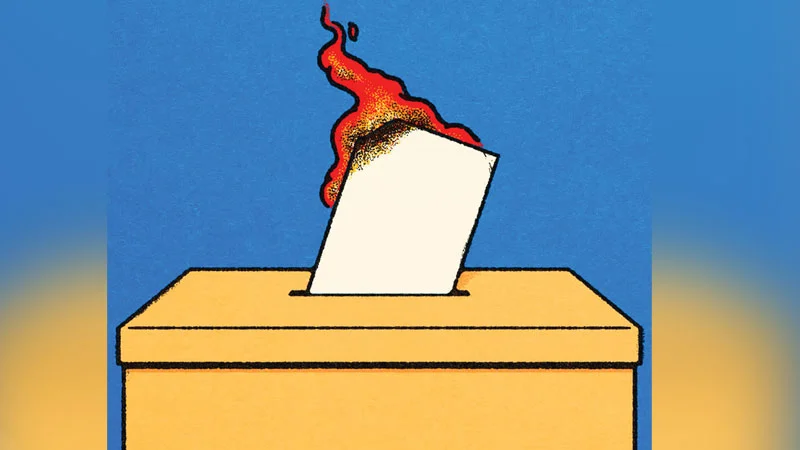More than half of the world's population will vote in their national elections this year. Never before have so many countries in the world gone to the polls in the same year. In that sense, the year is going to be a milestone. Based on voter turnout in recent elections held in countries, it can be said that about 2 billion people will participate in elections this year in more than 70 countries. From Britain to Bangladesh, from India to Indonesia, these elections will be held. This event can be a great occasion for democracy-loving people. But it seems that that hope will fall into the dust. Because what democratic elections mean, a large part is likely to be far from it.
It would not be wrong to express such fears - through many elections held this year, illiberal regimes may take root in countries; other elections will tear the fate of corrupt and incompetent people. Even the most important contest so far, the US presidential election, which is expected to be the most important contest, will be toxic and divisive among the people. These negative factors will have such an impact on the election that it will undoubtedly shake up world politics. As a result, the US position on countries from conflict-ridden Ukraine to the Middle East may change. Even the world order that the American leadership has advocated for so far may be at risk. In other words, the new year will be tense on one hand, and dangerous on the other.
Some elections will be downright bad. Take Belarus or Rwanda, for example; where the only question is how close the incumbent will get to 100 percent of the vote. In Belarus, Lukashenko has wielded all the power as president since 1994. In 2004, he scrapped the constitutional provision that would prevent a president from serving two terms; although the provision was reinstated in 2022, it only applies to a new president.
In Rwanda, Paul Kagame has been president since 2000. The presidential term there is seven years. The constitution prevents anyone from serving more than two terms. Kagame removed the constitutional barrier in 2015. Now he is preparing to remain the country's tyrant for another decade.
Russia also had a law that no one could serve more than two terms as president. In 2020, Vladimir Putin illegally changed the constitution to remove that presidential term limit. Now, there is no doubt that Vladimir Putin will be inaugurated as Russian president for a third consecutive term (and fifth overall) this year.
This year, most of the ballots will be cast in Asia. The continent’s largest democracies – Bangladesh, India and Indonesia – are all going to the polls this year. Here too, unfortunately, the dangers of liberalism are growing. Under Narendra Modi, India has made remarkable economic and geopolitical gains. On the other hand, the prime minister’s anti-Muslim bigotry and dismantling of democratic institutions are not gaining traction in the eyes of Indians. Indonesian President Joko Widodo seems focused on establishing a dynasty. Bangladesh has already turned authoritarian. Opposition leaders are imprisoned there and dissent is not tolerated.
Africa is set to hold its biggest election this year, but voters are increasingly frustrated with how democracy works. Military coups are commonplace on the continent. Nine countries have been seized by the military since 2020. Opinion polls suggest that more African countries are likely to be willing to go under military rule in the coming days. South Africa will also hold national elections in the new year. But they are likely to be a reminder of a series of disappointments. The first post-apartheid elections saw the African National Congress (ANC) party, led by Nelson Mandela, the movement's main leader. The ANC has been in power for three decades. But the country is now mired in corruption, crime and unemployment, and the ANC is coming to power again.
Amidst all the despair, there is some good news. Mexico is set to elect its first female president in 2024. The two main contenders in the election, to be held in the second week of June, are both women and less populist than the incumbent. British voters are finally getting a chance to choose between two viable candidates. After 14 years of Tory rule, the Labour Party is poised to win. But few outside Britain will notice the change.
This year, elections are being held in countries whose influence will be felt far beyond their borders. Whether Taiwan’s 18 million voters choose between the ruling Democratic Progressive Party and the Kuomintang (KMT), the pro-China opposition will have implications for cross-strait relations and, in turn, for the level of US-China tensions. A KMT victory may reduce the risk of conflict in the region in the short term, but in the medium term, Taiwan’s complacency could increase the risk of Chinese incursions and ultimately lead to a clash between the great powers.
But the US election is no match for any other in terms of the horrors or potential consequences. It's hard to believe that it's going to be a rematch between two old men, neither of whom are the preferred candidates of the majority of American voters. The vast majority of voters want neither party to nominate them.
Donald Trump's candidacy is an affront to American democracy. The Republican Party is going to nominate a person who tried to overturn the results of the last presidential election. It diminishes the role of the United States as a beacon of democracy. Trump's second term will hand the United States over to a madman with isolationist tendencies; and that too at a time when the country is in grave geopolitical danger. He likes iron men, especially people like Putin. And his announcement to end the Russia-Ukraine war within 24 hours indicates that he will actually implement it at the expense of Ukraine.
Some say Trump may not get the nomination, and even if he does, he may lose. But the chances of Trump winning a second term are alarmingly high. The consequences could be disastrous for democracy and the world.
Janie Minton Beddos: Editor-in-Chief, The Economist; Translated by Saifur Rahman Tapan







